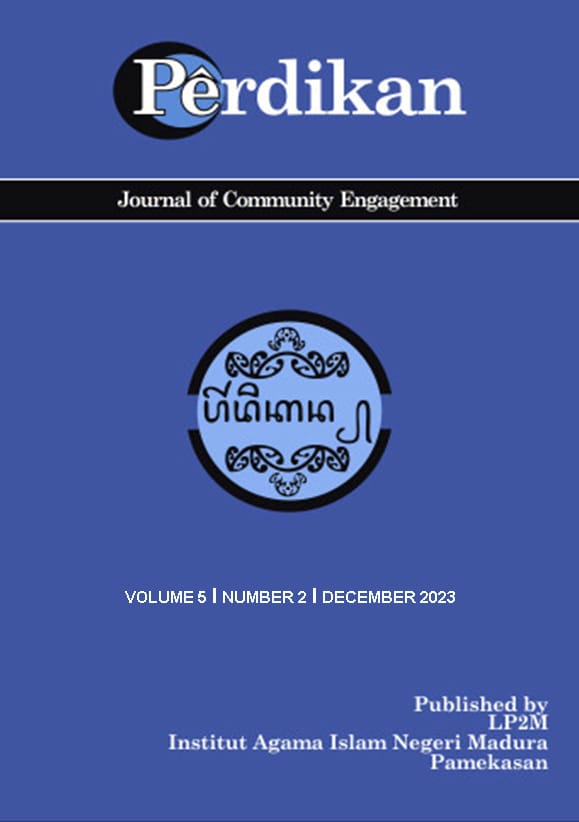Pelatihan digital entrepreneurship mewujudkan Generasi Z berjiwa wirausaha pada mahasiswa
 Abstract views: 674
,
Abstract views: 674
,
 PDF downloads: 313
PDF downloads: 313
Abstract
The problem faced by Generation Z is that they still need to gain more knowledge and understanding in using digital applications to market a product, and their motivation to start a business is shallow. This community service aims to improve Generation Z's ability in digital entrepreneurship to build a strong entrepreneurial spirit and mental readiness to run digital-based businesses. The methodology used in this service is the Participatory Action Research (PAR) method, which is a method for building participation in identifying the problems faced by Islamic Religious Education Study Program Students, Tarbiyah Faculty, IAIN Bone, analyzing, planning solutions together, then organizing existing resources, and carrying out various change actions and evaluating and reflecting on the results of the performance that has been carried out. The results of the service in implementing the training activities that have been carried out are as follows: First, Generation Z has the skills and tips for starting a business with minimal capital, including reading about business opportunities and self-motivation in achieving success. Second, they can use Digital Platforms via Social Media such as (Instagram, TikTok, and Facebook, which can be connected to the Shopee Application) in marketing and making money by utilizing the application. Third, Generation Z understands that starting a digital business requires free time and focus on building a digital business to maximize the business.
(Permasalahan yang dihadapi Generasi Z adalah masih rendahnya pengetahuan dan pemahaman generasi Z dalam penggunaan aplikasi digital untuk memasarkan sebuah produk, serta motivasi dalam memulai usaha sangat rendah. Adapun tujuan pengabdian kepada masyarakat ini adalah untuk meningkatkan kemampuan generasi Z dalam digital entrepreneurship guna membangun jiwa wirausaha yang kuat dan kesiapan mental dalam menjalankan usaha berbasis digital, Adapun Metodologi yang digunakan dalam pengabdian ini yaitu metode Participatory Action Riset (PAR) yaitu metode untuk membangun partisipasi didalam mengindentifikasi masalah yang hadapi masalah yang hadapi oleh Mahasiswa Program studi Pendidikan Agama Islam Fakultas Tarbiyah, IAIN Bone, menganalisis, merencanakan pemecahan secara bersama, kemudian mengorganisir sumber daya yang ada, dan melakukan berbagai aksi perubahan dan melakukan evaluasi dan refleksi dari hasil kinerja yang telah dilakukan. Adapun Hasil pengabdian dalam pelaksanaan kegiatan Pelatihan yang telah dilaksanakan yaitu, Pertama Generasi Z telah memiliki kemampuan dan tips dalam memulai usaha dengan modal yang sangat terbatas, termasuk membaca peluang usaha dan motivasi diri dalam mencapai kesuksesan. Kedua, memiliki kemampuan menggunakan platform digital melalui Sosial Media seperti (Instagram, Tiktok, Facebook yang dapat dihubungkan dengan Aplikasi Shopee) dalam memasarkan dan menghasilkan uang dengan memanfaatkan aplikasi tersebut. Ketiga Generasi Z telah memiliki pemahaman yang baik bahwa dalam memulai usaha dan bisnis digital memang membutuhkan waktu luang dan fokus didalam mambangun usaha dan bisnis digital sehingga usaha dan bisnis yang dijalani dapat lebih maksimal.)
Downloads
References
Abdillah, F. Q., Kadir, A. R., & Ismail, M. (2023). Pengaruh Frekuensi Digital Marketing Terhadap Traffic Media Marketing Makanan dan Minuman di Kota Makassar. Journal of Business Issues, 2(1), 107–114.
Annur, C. M. (2023, September 20). Pengguna Internet di Indonesia Tembus 213 Juta Orang hingga Awal 2023. Retrieved December 31, 2023, from https://databoks.katadata.co.id/datapublish/2023/09/20/pengguna-internet-di-indonesia-tembus-213-juta-orang-hingga-awal-2023
Arianto, B. (2021). Pengembangan UMKM Digital di Masa Pandemi Covid-19. ATRABIS: Jurnal Administrasi Bisnis (e-Journal), 6(2), 233–247. https://doi.org/10.38204/atrabis.v6i2.512
Arta, A., Faizal, M. A., Asiyah, B. N., & Mashudi. (2023). The Role of Edupreneurship in Gen Z in Shaping Independent and Creative Young Generation. Maro: Jurnal Ekonomi Syariah dan Bisnis (M-JESB), 6(2), 231–241. https://doi.org/10.31949/maro.v6i2.5673
Bismala, L. (2021). The Role of Entrepreneurship Education in Improving Student Competency. Jurnal Entrepreneur dan Entrepreneurship, 10(1), 35–42. https://doi.org/10.37715/jee.v10i1.1576
Giones, F., & Brem, A. (2017a). Digital Technology Entrepreneurship: A Definition and Research Agenda. Technology Innovation Management Review, 7(5), 44–51. https://doi.org/10.22215/timreview1076
Grow, J. M., & Yang, S. (2018). Generation-Z Enters the Advertising Workplace: Expectations Through a Gendered Lens. Journal of Advertising Education, 22(1), 7–22. https://doi.org/10.1177/1098048218768595
Gunawan, A., & Hazwardy, D. (2020). Pelatihan Digital Entrepreneurship untuk Mewujudkan Generasi Milenial Berjiwa Wirausaha. Abdimas Dewantara, 3(1), 81. https://doi.org/10.30738/ad.v3i1.4311
Hardiyanto, L. (2018). Motivasi Mahasiswa Menjadi Start Up Digital Entrepreneur: Technopreneurship. Jurnal Ilmu Pendidikan (JIP) STKIP Kusuma Negara, 10(1), 1–15.
Kurniawati, L. (2021). Strategi Digital Marketing dan Komunikasi Bisnis untuk Enterpreneur Pemula di Indonesia. Sang Pencerah: Jurnal Ilmiah Universitas Muhammadiyah Buton, 7(3), 371–391. https://doi.org/10.35326/pencerah.v7i3.1291
Mahmudan, A. (2023, June 30). Survei: Kian Muda Generasi, Penetrasi Internet Makin Tinggi. Retrieved December 31, 2023, from https://dataindonesia.id/internet/detail/survei-kian-muda-generasi-penetrasi-internet-makin-tinggi
Mavilinda, H. F., Nazaruddin, A., Nofiawaty, N., & Siregar, L. D. (2021). Menjadi “UMKM Unggul” Melalui Optimalisasi Strategi Pemasaran Digital dalam Menghadapi Tantangan Bisnis di Era New Normal. Sricommerce: Journal of Sriwijaya Community Services, 2(1), 17–28. https://doi.org/10.29259/jscs.v2i1.29
Copyright (c) 2023 PERDIKAN (Journal of Community Engagement)

This work is licensed under a Creative Commons Attribution-NonCommercial 4.0 International License.
In order for PERDIKAN to publish and disseminate research articles, we need publishing rights. This is determined by a publishing agreement between the author and PERDIKAN. This agreement deals with the transfer or license of the copyright to PERDIKAN and authors retain significant rights to use and share their own published articles. For both subscription and open access articles, published in proprietary titles, PERDIKAN is granted the following rights:
- The right to provide the article in all forms and media so the article can be used on the latest technology even after publication.
- The authority to enforce the rights in the article, on behalf of an author, against third parties, for example in the case of plagiarism or copyright infringement.
Copyright aims to protect the specific way the article has been written to describe an experiment and the results. PERDIKAN is committed to its authors to protect and defend their work and their reputation and takes allegations of infringement, plagiarism, ethic disputes and fraud very seriously.
If an author becomes aware of a possible plagiarism, fraud or infringement we recommend contacting their PERDIKAN publishing contact who can then liaise with our in-house legal department. Note that certain open access user licenses may permit



1.png)


1.png)


